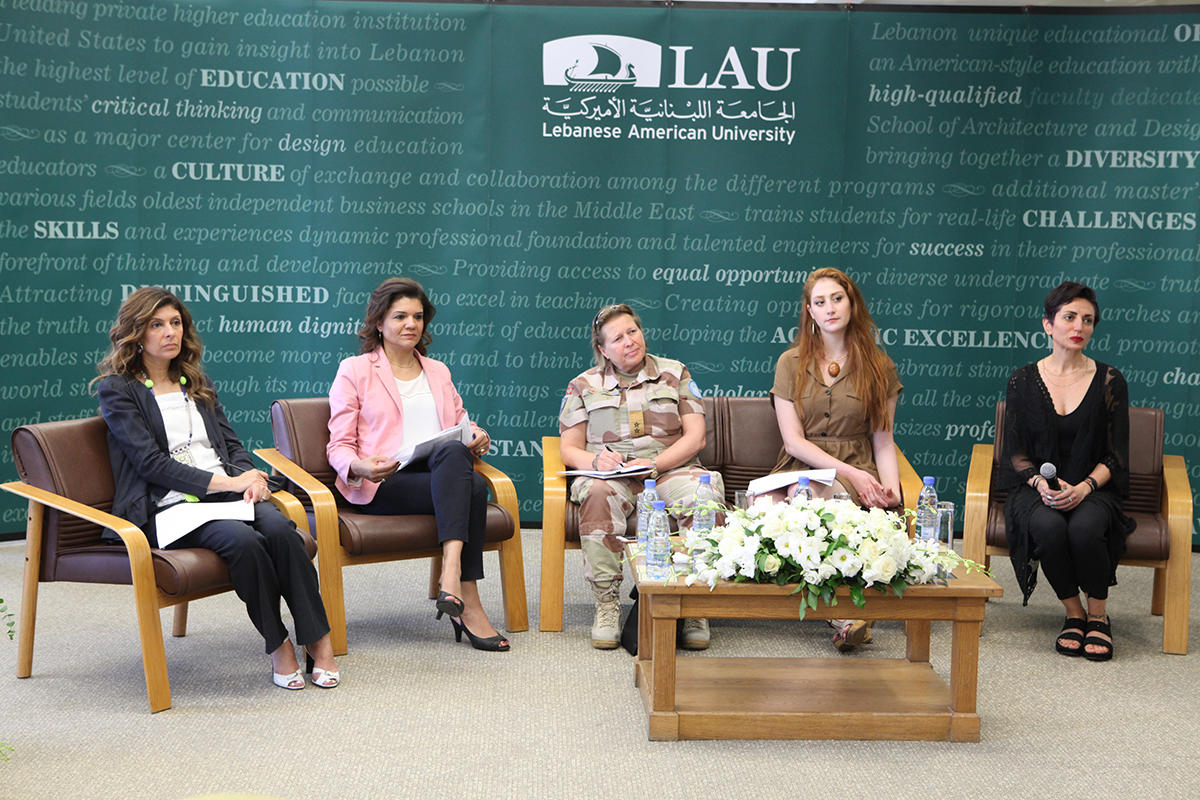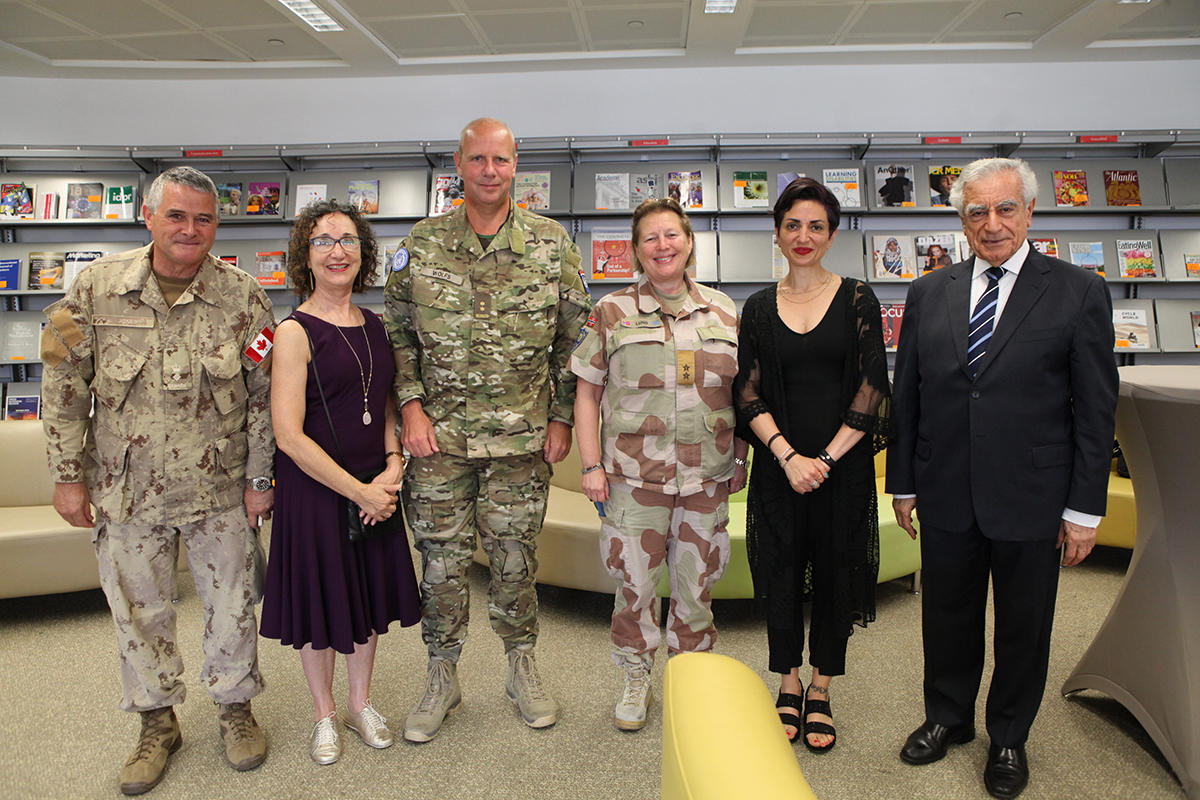Advancing the Women, Peace, and Security Agenda in the Arab Region
In collaboration with the United Nations Economic and Social Commission for Western Asia (ESCWA), the Arab Institute for Women (AiW) hosted a panel discussion at the Lebanese American University on Advancing the Women, Peace, and Security Agenda in the Arab Region. Moderated by the Executive Director of AiW, Dr. Lina Abirafeh, the conversation was carried out by five pioneers of gender equality in both the Arab region and the world: Ms. Abir Chebaro, Vice President for the National Commission for Lebanese Women (NCLW), Ms. Mehrinaz Al-Awady, the Director for the Center for Women at ESCWA, Ms. Serene Dardari, the founder of Chams Network, Ms. Njoki Kinyanjui, the Chief of Gender Unit and Senior Gender Adviser at the UN Department of Peace Operations, and key note speaker Major General Kristin Lund, Head of Mission of the United Nations Truce Supervision Organization (UNTSO).
In her speech, Abir Chebaro focused on the process of developing the Lebanese 1325 National Action Plan (NAP) for Women for 2017-2019. She discussed the four pillars that make up the priorities of the NAP: participation, prevention, protection and relief. The first pillar aims at developing strategies for women to allow them to participate in decision making in political, public and economic life. The second pillar seeks to prevent conflict by decreasing tensions at a national level and using the role of women to prevent violent extremism. The third pillar focuses on overcoming Sexual and Gender Based Violence, specifically by protecting boys and girls from violent and exploitative practices. The fourth pillar aims to provide women and children relief from conflict. When speaking of the challenges of the National Action Plan, Abir talked about the difficulty of financing it, with costs summing up to approximately $15 million.
Mehrinaz Al-Awady discussed the need for change in the Arab region in order to achieve gender equality: “There is still an evident reluctance [in the Arab Region] to include women in the peace-making process.” Despite the challenges women have faced, especially in countries that are at war such as Libya, Syria and Yemen, Mehrinaz discussed how amongst all of the disruption, “there is a glimmer of hope. Arab women have demonstrated significant resilience and agency when facing challenges”. Amongst other examples, she talked about the women in Sudan who participated in igniting protests for the long-standing ruler Omar Bashir and Syrian women who have recently participated in peace talks as the civil war starts to come to an end. “Arab women play a key role in creating a sustained peace (…) we need to work together to break values and create resilience.” She also highlighted ESCWA’s role in working with member States to be truly inclusive and participatory, creating space for women in the front lines to influence policy, ensuring that it is anchored in local realities, and echoing women’s voices. Serene Dardari highlighted the importance of the participation of women and young people for the development of society. “The political economy of the Arab world is one of exclusion and conflict (…) without the ability of young people and women to express themselves and without solid institutions to represent them over the ever-shifting balance of society, peace and prosperity will forever remain an illusion.” She emphasized the need for access to online education for women from marginalised communities, the need for the upbringing of feminist men through a reprogramming of media and labour institutions, better resource management, and an increase in self-care. “I believe that humans are lacking love. We are forgetting love. Love is a development tool.”
Njoki Kinyanjui revisited the UN architecture for peace and security and what future directions need to be taken. She stated that the aim is to “ensure and enhance women’s meaningful participation [in order to] achieve sustainable peace.” She believes that three important things needed to be done to guarantee the achievement of goals: ensuring accountability and leadership for women peace and security, generating evidence and research to prove that the role of women in society needs to be fortified and improved, and strengthening strategical partnerships with women’s organisations to ensure that they are part of the decision-making process.
Major General Kristin Lund reflected on her career and the lessons learnt on Women, Peace, and Security. Coming from Norway, a country where gender equality has been on the agenda for many years, she “has something to mirror back to and see.” She talked about the development of the military for women in Norway since 1977, and the struggles she faced in joining a male-dominated organisation. “I had to work twice as hard as men to be addressed as an equal.” When she became a force commander of 1000 soldiers in Cyprus, she was shocked by her level of influence. Her experience in the Middle East allowed her to realise what is needed to strengthen the cause for gender equality. “Regardless of political opinion and differences, women need to be supported by fellow women. Numbers matter.” She also stressed the need for men and women to work together. “There are differences between men and women (…) working together allows us to fulfil each other.”



